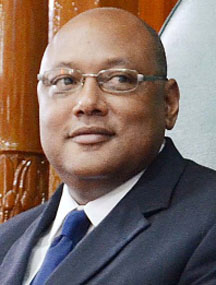Speaker of the National Assembly Raphael Trotman has announced that he would be seeking to hire experts to draft legislation for the opposition, and he is also seeking guidance on the enforcement of motions that have been passed.
Trotman was speaking at a two-hour training session for members of the media at the Public Buildings yesterday, in anticipation of Thursday’s sitting of the National Assembly, which is the first after the parliamentary recess.
“I have received tacit support for legal counsel to be hired by the National Assembly to assist with drafting and interpretation,” he said, adding that while he himself is a lawyer and that there are many lawyers on the opposition benches, it will be a bad idea to rely on their interpretation hence the need for experts.
His comments come in wake of Opposition Leader David Granger saying that the opposition parties were seeking external assistance in drafting legislation to bring to the National Assembly, in light of the Attorney General making it clear that his office would not be providing assistance.
Trotman noted that he thought the Attorney General Anil Nandlall’s proclamation was an affront to the institution of Parliament. “And I have been quietly looking to find ways to get MPs trained. I have managed to get such a training seminar in place and it will be held later this month,” he also said, telling this newspaper that there will be a second seminar early next year.
President Donald Ramotar has declared that he would not assent to any legislation that does not have the government’s input, and Trotman reiterated that this was an unfortunate development. “He has received the worst possible advice on that and I said so before. His function is to execute, ours is to pass and he should not get mixed up with this thing,” he added.

Trotman yesterday also noted that he is seeking guidance from the Erskine May parliamentary guidebook and from other countries in the Commonwealth on the enforcement of motions passed in the National Assembly.
“I have started doing research from [Erskine May’s Treatise on the Law, Pri-vileges, Proceedings and Usage of Parliament] and [consulting] Speakers from around the Commonwealth [about this],” said Trotman. He anticipates that it will be contentious when he gets around to addressing the matter at the commencement of the session this Thursday.
Also in attendance at yesterday’s training session was Clerk of the National Assembly Sherlock Isaacs, who said that when motions are passed in the National Assembly, they ought to be respected. He said that the result of non-compliance with a motion by the person to whom it is directed could result in that person being summoned and locked up.
The National Assembly, during the first session passed a number of motions calling for investigations into the operations of the National Industrial and Commercial Investments Limited (NICIL) and one expressing no-confidence in Minister of Home Affairs Clement Rohee and calling on the President to remove him as a minister in the Cabinet. It also passed one that called for a repeal of the President’s Benefits and Other Facilities Act and a review of the benefits to which a former President is entitled.
In an earlier interview with this newspaper, Trotman noted that motions are not Acts of Parliament, but statements of declaration. “And so the National Assembly in its own right does have kind of quasi-judicial power – like a High Court – and it can devise its own means of enforcing its powers,” Trotman said.
“Some of these motions are intended to have extra-territorial jurisdiction. I know that this is a matter that we are going to review,” he said.
“Under the Westminster System, when the Parliament makes a resolution or a motion, government and all its departments are supposed to bring themselves into line. That is convention. Convention in the UK and elsewhere has given right to having the force of law. It is like an unwritten law that these are to be complied with,” he said, adding that is it another area of constitutionality on which he would have to get legal advice. “I believe that within the Parliament the Assembly could make some determining decisions about what it has control over immediately,” he said, adding that it may not have the power to make changes outside of its walls.
“We are in an opposition-controlled Parliament and I think that the opposition needs to see itself less as an opposition and more as being in charge of many of these things,” he said. “You are in an asymmetrical arrangement in a sense and there are many ways to use your strength as the opposition,” Trotman stated. “You may say that you do not have executive power but that executive power needs you and you need that executive power,” he said, adding that the opposition has within its powers many devices and tools to have its decisions enforced.
At the end of the day, he further said, there needs to be a modus vivendi that sees the two sides working out a relationship on how to proceed.





